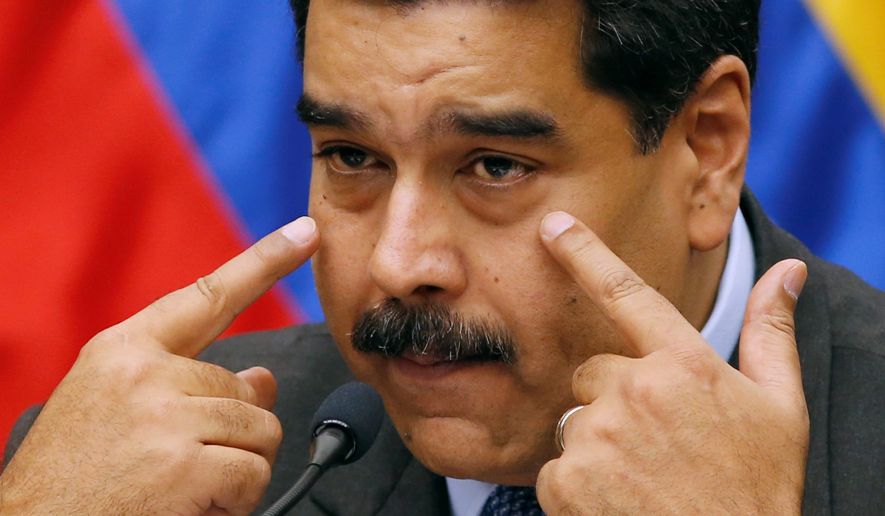The Treasury Department’s point man on combating illicit financing bluntly warned the socialist government of Venezuela not to try to evade mounting U.S. sanctions, predicting those efforts will fail.
The Trump administration is in a battle of wills with the government of socialist President Nicolas Maduro over Venezuela’s collapsing economy, political repression and a refugee crisis that threatens to destabilize the South American country’s neighbors. Caracas recently announced plans to fight a mounting slate of U.S. sanctions by resorting to transactions in a new cryptocurrency financial instrument tied to the country’s oil wealth.
Mr. Maduro “should stick with handing out rabbits and eating empanadas, because going into cryptocurrencies is not his strong suit,” Assistant Secretary for Terrorist Financing Marshall Billingslea said of the scheme.
Last month, the Trump administration slapped financial sanctions on four members of Mr. Maduro’s inner circle, including his wife, first lady Cilia Flores. At the time, Mr. Maduro responded by saying: “If you want to attack me, attack me, but do not mess with Cilia. Do not mess with the family. Do not be cowards.”
Mr. Billingslea outlined to a session at the Brookings Institution think tank Wednesday the evolution of “targeted” financial sanctions U.S. policymakers can levy on individuals or entities, particularly after the passage of the Global Magnitsky Act of 2016 and a subsequent expansion of the law by President Trump via executive order.
Geoff Ramsey, a Venezuela expert at the Washington Office on Latin America (WOLA) think tank, warned that the Trump administration needed to better explain to struggling Venezuelans who face growing shortages of food, medicine, and basic staples that U.S. sanctions were not designed to hurt them.
Mr. Maduro regularly blames Washington for his domestic policy failures, Mr. Ramsey said at the Brookings event, citing a recent poll showing that 43 percent of Venezuelans surveyed said they thought that U.S. sanctions had affected them.
Mr. Billingslea agreed with the need to counter Mr. Maduro’s messaging on U.S. sanctions.
He also appealed to world leaders to do more to unearth the “financial lifelines” that China and Russia provide to Caracas.
Over the past decade, China, Russia and Cuba have helped prop up the Venezuelan government, despite the fact that Venezuela boasts one of the world largest proven deposits of oil and natural gas. Moscow provides the bulk of the Venezuelan military’s weapons, while China is the country’s largest creditor, holding more than $20 billion in Venezuelan debt.
“The Russians and Chinese need to be transparent about the credit lines they are extending,” Mr. Billingslea said.
Separately, a Harvard-educated conflict resolution expert who worked to ease tensions in Venezuela following a 2002 coup against then-President Hugo Chavez, is flying to Caracas next week to attempt to jump-start political dialogue in the deeply polarized country, The Associated Press reported.
The trip by Spanish-speaking mediator Jim Tull has been organized by Senate Foreign Relations Committee Chairman Bob Corker, Tennessee Republican, and the Boston Group, an informal network of U.S. and Venezuelan lawmakers from across the political and economic spectrum, including Democrats, Republicans, socialists and capitalists, who are concerned about Venezuela.
Mr. Corker’s top Latin American policy aide Caleb McCarry met twice earlier this month in Caracas with Mr. Maduro to push for dialogue, the AP reported.
• Dan Boylan can be reached at dboylan@washingtontimes.com.




Please read our comment policy before commenting.